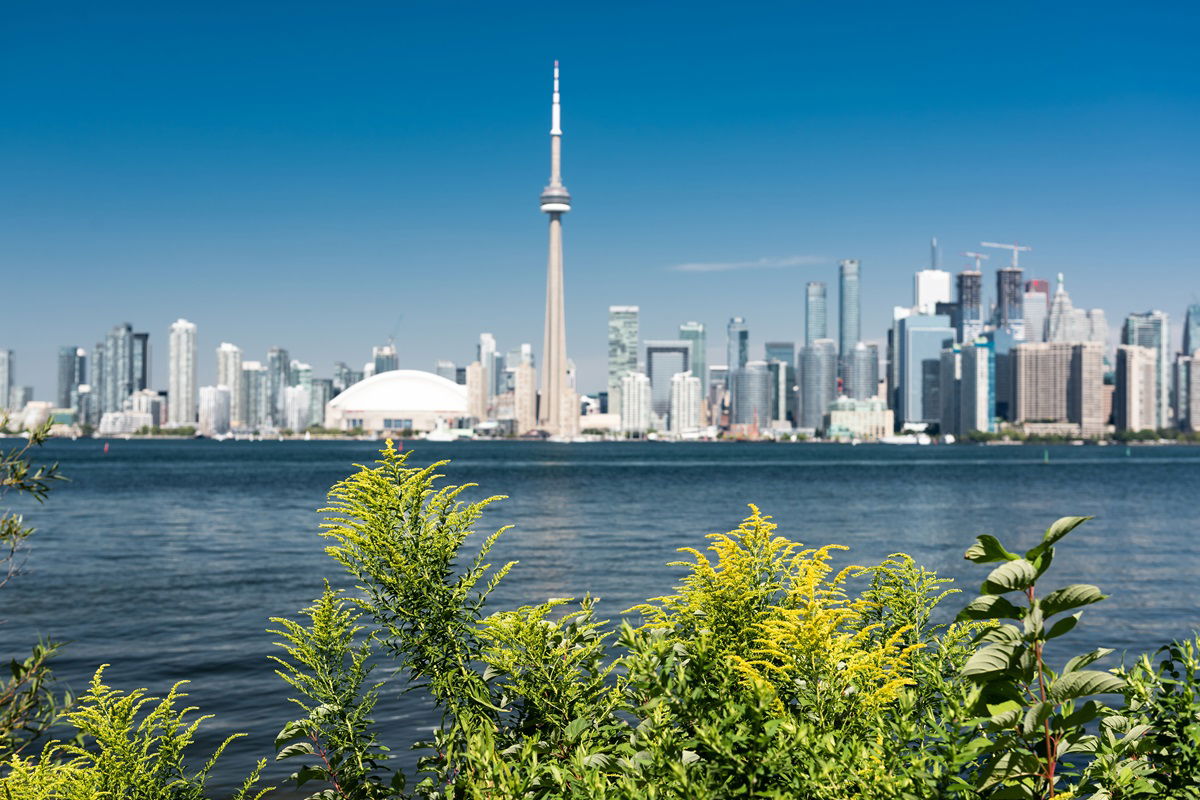
Living in Canada
Canada is known for its high standard of living and above-average healthcare and education systems. Plus, its unemployment and crime rates are low. Canada’s breathtaking nature makes for an ideal backdrop for outdoor leisure activities.
In this article, we take a closer look at what it really means to live in Canada and share some useful tips for those looking to emigrate to the Great White North.
Leisure activities in the Canadian outdoors
The majority of its immigrants are drawn in by Canada’s diverse landscapes. Covered by nearly 70 per cent nature, Canada offers a plethora of opportunities to experience the wild outdoors – whether that’s through hiking, trekking or wilderness tours, winter sports, camping, biking, or swimming in one of the country’s magnificent lakes. As an employee in Canada, you get an average of two to three weeks’ holiday.
Canada’s climate: polar to maritime
Canada’s climate ranges from polar in the north to continental throughout the majority of the country to maritime on the west coast. Canadian winters can be very cold, but that also means that its summers can be pleasantly warm and not too hot. Canada is famous for its colourful and warm autumn when the forests light up in bright autumn colours, which makes for a true spectacle! But at the same time, Canada is not exempt from natural disasters, such as bushfires, tropical storms, earthquakes, volcanic activity and even tsunamis. Make sure you research which of these risks may affect the area you are considering living in.
Infrastructure & driving in Canada
Mediocre infrastructure
Building an infrastructure for a country that expands over 9.9 million square kilometres is no easy feat. Add to that Canada’s low population density and it is no surprise that there is only one train route from east to west. Unfortunately, the country’s rail transport is also quite underdeveloped, which makes commuting by train next to impossible. To make up for that, Canada has a well-developed domestic flight network with around 75 regional airlines, which is crucial to get people to remote regions. Canada also has an extensive network of intercity buses. In big cities, there are plenty of public transport options, including suburban rail, underground trains, and buses.
Driving in Canada: high motorisation rate
With Canada’s transport network not being as developed as it could be, many choose to commute by car, as shown by the country’s high motorisation rate. Canadians drive on the right side of the road. Speed limits are lower than in Germany and vary by province and territory. One of Canada’s traffic regulations requires you to drive with dipped headlights, even during the day. Also, your blood alcohol levels must not exceed 0.8 (0.0 for new drivers). If you violate these rules, you might be charged with severe penalties, so please research Canada’s speed limits and traffic regulations ahead of time.
Please note: When coming to Canada it is sufficient for the first few months if you carry a certified translation of your driving licence together with your German driver's licence. If you emigrate to Canada, you should have your driver's licence transferred into a Canadian driver's licence after three months at the latest. You can usually simply have this licence transferred. However, the requirements vary depending on the province and territory.
Solid healthcare system
Canada’s healthcare system compares to the German one in several ways. For example, all permanent residents have access to national health insurance. That includes immigrants with permanent visas, students on scholarships as well as seasonal and temporary workers. Health insurance generally covers essential and medically necessary services. Any extra care may vary depending on the province or territory. However, there is no set standard for what is “medically necessary”. Often, doctors will decide on a case-by-case basis. Provincial and territorial health plans in Canada each come with their own tariffs. Your best bet is to research the benefits of the province or territory you are considering moving to.
National health insurance in Canada does not cover the cost of cosmetic or dental treatments, eyeglasses, massages, patient transport or acupuncture, but you can use private health insurance for these and other services. As a patient, you must pay for prescription and over-the-counter medication yourself. Only then can you submit a claim to your health insurance company which will reimburse you for a percentage or the full amount. Please note that you may need a prescription for some meds in Canada even if they are over-the-counter in Germany and vice versa.
Canada has general practitioners (GPs), medical specialists, a 24-hour emergency service, hospitals and clinics. Walk-in clinics do not require you to make an appointment in advance. However, as in many countries, there is a shortage of doctors, making it difficult to find GPs that accept new patients. Making an appointment with a medical specialist can also be quite the challenge in Canada.
Above-average education system
Canada is known for its excellent education system. It usually performs among the best countries in international PISA (Program for International Student Assessment) studies. Particularly children of immigrants are said to be well integrated in Canada, scoring almost on par with their native-born classmates.
Each province is responsible for its residents’ education. A typical school day lasts until about 3 p.m. Up until a certain grade, all children attend school together. After 12 years, some of them go on to higher education. Most schools are state-funded, making them universally accessible. However, there are also some private schools in Canada that charge tuition.
Living costs by region
Like in Germany, each city and region in Canada has its own cost of living. Toronto is an expensive city with prices being similar to Munich’s. Montreal is cheaper by comparison and on a similar level to Berlin. According to the Canadian government, you should expect to spend about half your salary on rent and utilities – which brings us to our next question: how much can you make in Canada? Read more about that in our article “Working in Canada”.
Are you thinking about buying real estate in Canada? As of January 2023, the “Prohibition on the Purchase of Residential Property by Non-Canadians Act” prohibits non-Canadians from buying residential property. This law is set out to take effect until 1 January 2027 but has already been extended by two years.
But there are exceptions:
You can buy a house with more than three residential units, undeveloped plots of land and residential properties in remote areas.
Low unemployment & crime rates
Canada’s unemployment rate was 5.4 per cent in 2023, while the global average is 5.8 per cent, which means the Canadian unemployment rate is relatively low.
The same applies to its crime rate. While petty crime such as pickpocketing may occur in large cities, Canada has strict gun laws in place, unlike its neighbour to the south, the USA. The general rule is that you may only buy and own a weapon if you have a weapon licence. Importing weapons (e.g., from the USA) has been prohibited since 2022.
We hope that you now have a better understanding of what living in Canada might look like for you.




Key data about Canada
- Population: approx. 39 million
- Size: 9.98 million square kilometres; 70 per cent nature; second largest country in the world by surface area
- Canada has 10 provinces and 3 territories
- Capital: Ottawa
- Largest city: Toronto
- Currency: Canadian dollar (CAD), usually labelled as $
- Metric system: distances are measured in kilometres, metres, etc.
- Official languages: English; French in some regions
- Road traffic: right-hand traffic, speeds are measured in km/h (kilometres per hour)
- German Embassy in Canada: Ottawa (Consulate General locations in Montreal, Toronto, and Vancouver)
More information
If you want to find out more about working in Canada or the different visa types for permanent residence, have a look at our other guides:
FAQs: Living in Canada
Each city and region in Canada has its own cost of living, just like in Germany. Living in Toronto is about as expensive as living in Munich, while Montreal is cheaper and more comparable to Berlin. According to the Canadian government, you should expect to spend about half your salary on rent and utilities.
To emigrate to Canada, you need a visa, a clean police clearance certificate (also known as a certificate of good conduct) and sufficient financial means to cover your cost of living.
To live in Candida as a German citizen, you need to apply for a visa. Have a look at the Skilled Worker Program as well as the Provincial Nominee Program (PNP).
Yes, but you will need a visa.
Most Canada-based Germans live in the provinces of Saskatchewan, Manitoba, and Alberta and in the cities of Toronto, Vancouver, and Winnipeg.
Canada is home to black bears, polar bears, grizzlies, reindeer, cougars, wolves and bison.
Known for its excellent healthcare and school system, its low unemployment rate and strong safety levels, Canada has a very high quality of life. Plus, the working conditions in Canada are very similar to those in Europe. A typical full-time work contract spans over 40 hours a week, and you usually get two to three weeks’ holiday a year.
To live and work in Canada, you need to apply for a visa.
Canada has a total of 39 million inhabitants, three million of which are Germans.





